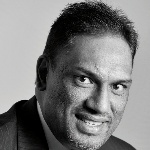View Points >> Viewpoints
 Ahmed Simjee, IBM
Ahmed Simjee, IBM
The world is going to have to get very serious, very quickly, about something it was able to ignore last century: water management. In just the last 100 years, global water usage has increased at twice the rate of population growth. By 2025, two-thirds of the globe is expected to encounter water scarcity.
While we must continue to improve access to water, societies must also focus on how to manage that water. In almost every case today, the systems designed to handle it, waste it. In some areas, up to 50% of the water flowing through a system is lost due to leaky infrastructure.
The problem is that for too long, water hasn’t been measured and monitored. Until recently, in most of the world, there was little reason to take these basic steps. But now, the days of readily available sources of water are coming to an end.
Companies and government agencies around the world are starting to hammer out what the era of water management will look like. At the heart of these new systems is data. By monitoring and measuring water, we can analyse where it’s being lost, how it’s becoming polluted, and craft models for how best to use and protect it.
Waste and water management companies, for instance, are starting to use analytics and mapping technologies. These systems can rapidly pinpoint problems, such as a burst water main, a slow leak, or hazardous sewage overflow, saving precious water resources. Using wireless sensors and advanced metering systems, some are tracking the water as it flows through transmission pipes to distributors which provide water to businesses, homes and farmers.
Because water has been so abundant for many societies, businesses and farmers, there’s been little effort to understand the resource. In a time when demand for water is booming, the world must become more insightful about a resource that’s becoming increasingly precious. These are going to become the standard practices for managing water going forward. To put these practices into place, collecting data will become as essential as collecting water.
About the author: Ahmed Simjee is executive: public sector
at IBM.
|
Post a comment
|
Login.
All rights reserved © Copyright by ITWeb, 2011


